Frank Zappa once said, “Without deviation from the norm, progress is not possible.” With those nine words, he inspired a multitude of artists and creatives to go outside of the box. Innovation is precisely what a luthier brings to the art of guitar building. A luthier is a builder of stringed instruments. Luthiers who specialize in custom guitar building are constantly pushing past traditional modes to bring new possibilities and designs to the development of a guitar, an instrument that is generally bound by centuries of rigid and corporate-backed expectations in its production.
The guitar is an extension of the musician, a voice for their art and can be as unique as each individual player. This is especially true when one goes beyond the big box store and steps into the quaint, sawdust-riddled shop of a luthier. Denver boasts many fine luthiers who chisel, carve and sand their way past the norm towards possibility. 303 Magazine had the privilege to get to know a few of Denver’s progressive artisans.
Learn Guitars
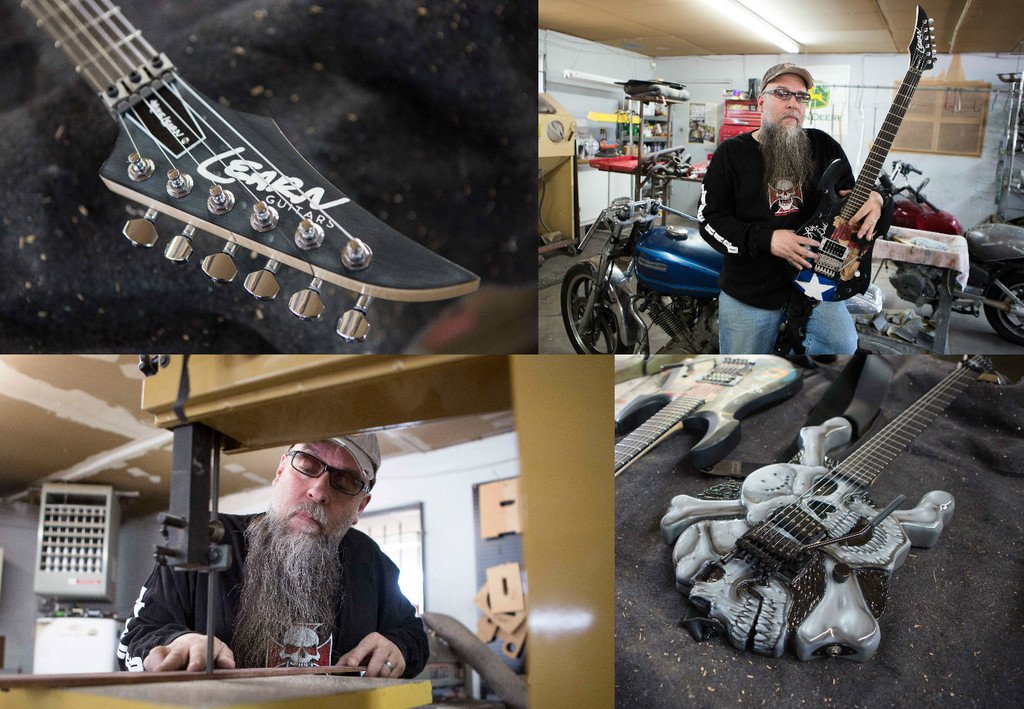
Location: Boulder County, Colorado
Specializes in: Custom airbrush artistry, handcrafted custom guitars
Background: The airbrushed artwork of Mike Learn of Learn Guitars was born to adorn the axes of metal gods and more than once, it has. In fact, Learn has airbrushed his artwork on hundreds of musicians’ guitars. Having worked for powerhouses such as Jackson, Charvel, BC Rich, Schecter, ESP and Dean, Learn has had the opportunity to work with a wide range of musicians including members of Def Leppard, Arch Enemy, Queensryche and many more.
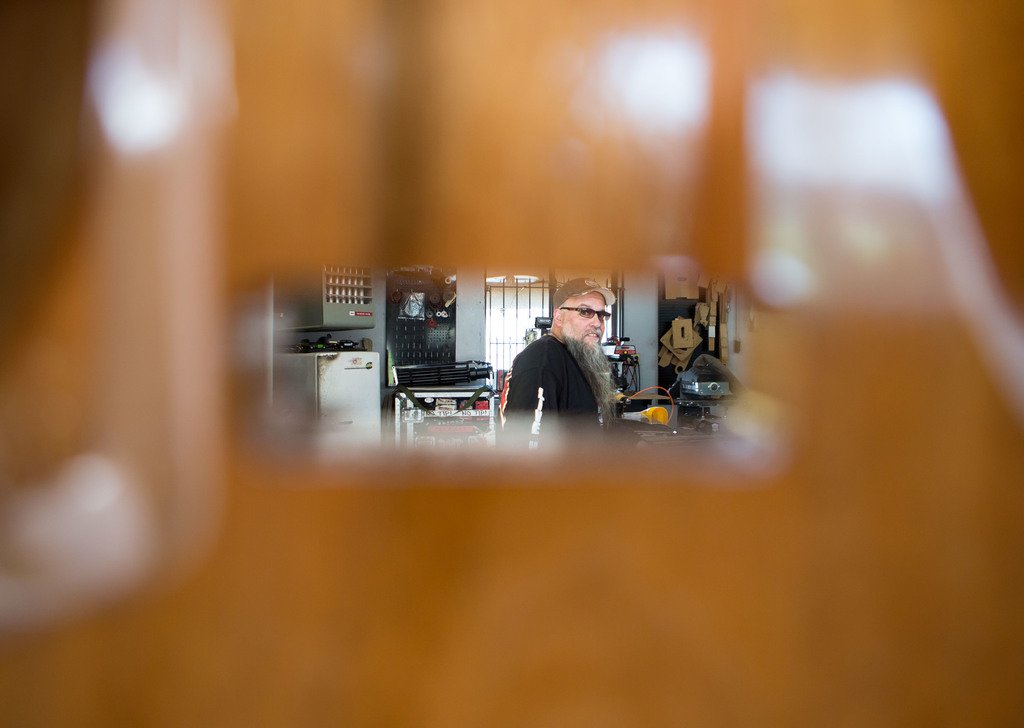
Learn built his first guitar in 1981 entering it and placing in a Pennsylvania State Vocational Competition. He began his journey to becoming a luthier from a desire to build and own a custom guitar of his own. In the 1990s, he moved to Arizona and joined the Arizona League of Luthiers where some of the members were instructors who hailed from the famous Roberto-Venn School of Luthiery. He spent his time there refining his skills building archtop acoustic jazz guitars and would later develop an educational and inspirational relationship with Robert Benedetto of Benedetto Guitars.
Artistry: The hundreds of hours Learn spent building in Arizona gave him the confidence he needed to delve into building complex electric guitars. “I really enjoy hand-forming; putting my soul and often times a bit of blood into my guitar creations. There is no replacement for what the hand and eye can tell you that a guitar needs,” said Learn.
He spends time sorting through wood at Austin Hardwoods in search of resonant, light weight boards for his builds. He favors Honduran mahogany and alder for the bodies and maple and mahogany for the necks. “Wood has its own inherent properties and understanding exactly what the customer wants helps me to find the mix of woods and building techniques to obtain those results,” commented Learn. He is continually refining his process and has a couple of patents in development.
Learn’s band, Lords of Distortion, features him playing one of his custom builds and allows him the opportunity to live-test other builds to ensure that they are stage-worthy.
Learn sums up his guitar building as beautifully as his art, “When one person puts their heart into one instrument at a time, that process produces precise instruments; it is really about quality, not quantity.”
Texas Toast Custom Guitars
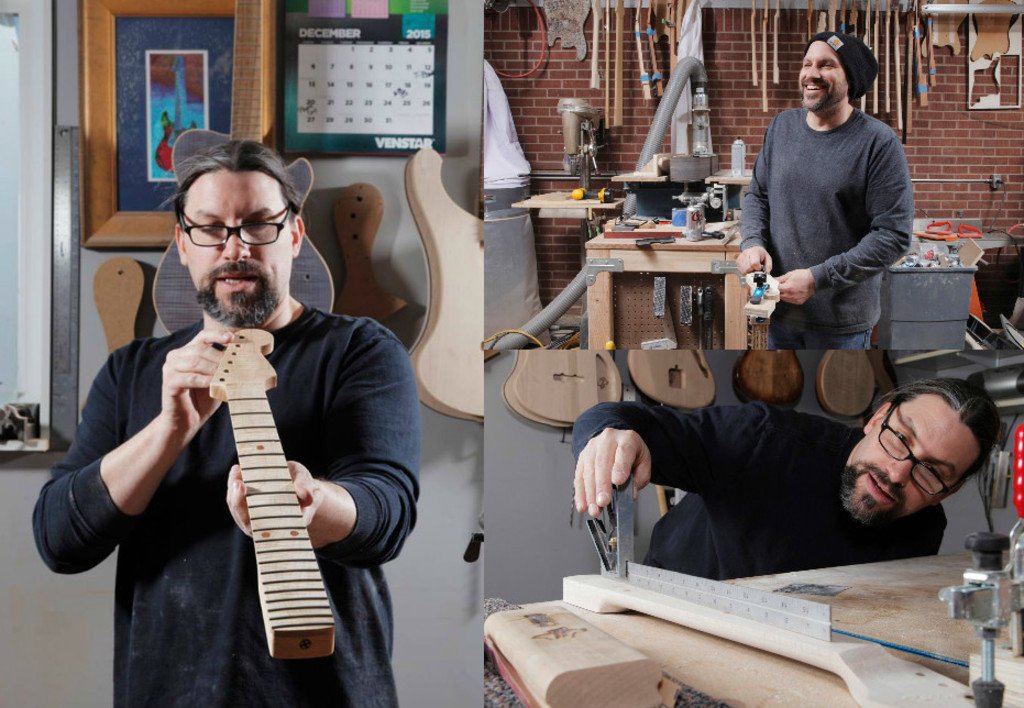
Location: Arvada, Colorado
Specializes in: Handcrafted custom guitars for musicians
Background: In a junior high shop class, Matt Flaherty of Texas Toast Custom Guitars, observed an older student work on building a copy of a BC Rich Ironbird bass guitar and he was hooked. Then, in high school, Flaherty came across an ad for the Roberto-Venn School of Luthiery, which he attended in 1989. He also apprenticed with Philip Bruce Clay of Rarebird Guitars and worked with him after attending Roberto-Venn. Later, Flaherty began playing in bands and using his day job money to fund purchases of tools to begin building. “Experience is a cruel teacher. It forces you to take the test before it gives you the lesson,” he said of those early days building.
Artistry: Flaherty uses only tools available from 1959 or earlier when building guitars. “Being a real craftsman is all about manipulating materials and machines with your hands, not having the machine do all of the work for you,” he elaborated.
Texas Toast Guitars are played by many of Denver’s local musicians including; Pauly Six from Kerry Pastine & The Crime Scene, Tony Nascar from the Railbenders and many more. His build process is kept simple in order to easily source materials that are known to produce the best results. “The tones my customers are constantly asking for come from putting all of the little pieces together. Wood is important, but there are other areas that are just as critical, like the truss-rod, neck joint, finish thickness and hardware,” explained Flaherty.
Flaherty has a new model coming soon to Texas Toast Custom Guitars which will be available in versions that will appeal to players who love the classics, but want something unique.
“A guiding principle of my craft is to run my own race, be true to myself and share the information I gather along the way,” said Flaherty.
VanDewart Guitars and The Guitarmory
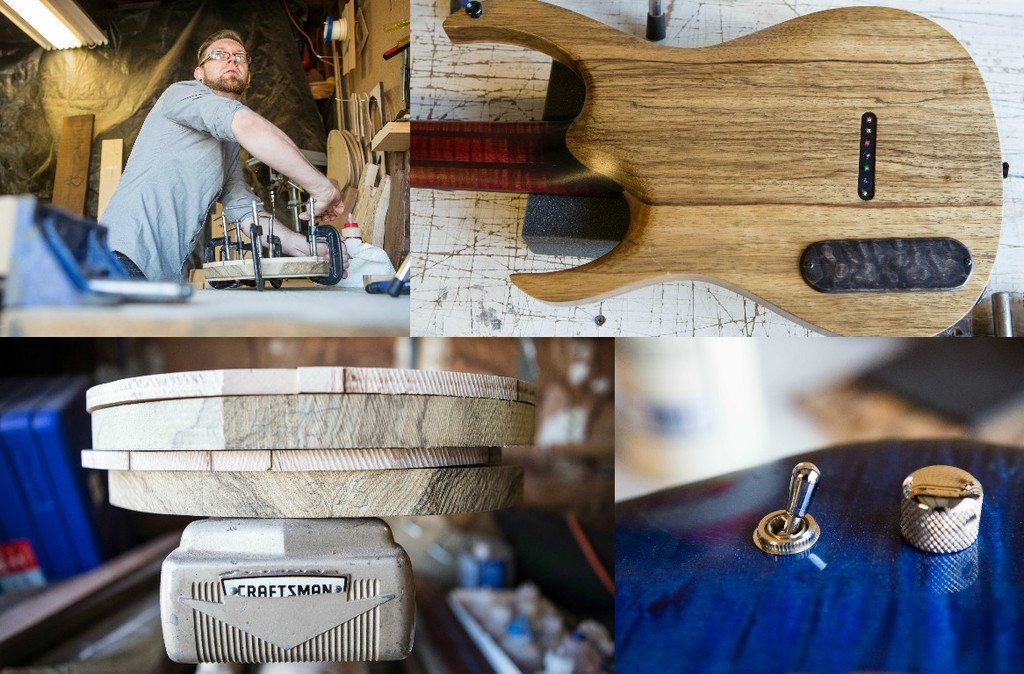
Location: Northglenn, Colorado
Specializes in: Handcrafted custom guitars and pickups
Background: Tone quality is an overarching theme for all guitar builders. Whether that is achieved through wood choice or electronics, it is an ever-present concern when it comes to custom guitar craftsmanship. Part of the achievement of various tones in an electric guitar comes from the quality of the pickups.
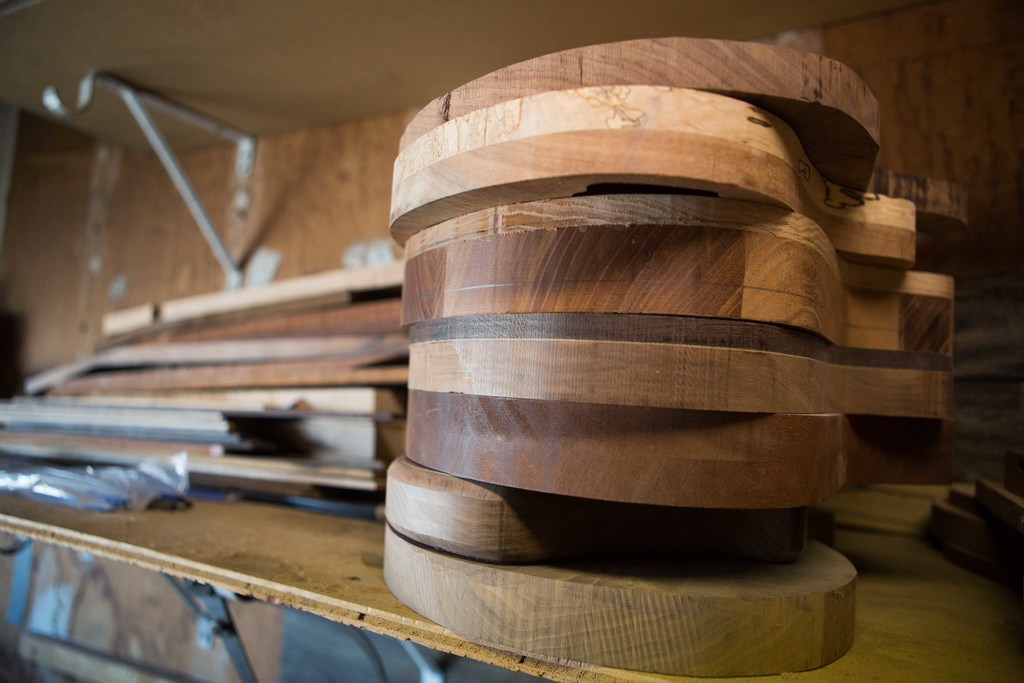
The Guitarmory is a pickup design company run by Dale Blakeman. Blakeman has been winding pickups for electric guitars since 2011. “I’m definitely a tone junkie that is always searching for the right tone and winding a variety of pickups provides me with the perfect sandbox to do that,” elaborated Blakeman. He got his start building custom guitars but found his niche and true passion in the creation of pickups. He has recently partnered with local luthier, Kyle VanDewart of VanDewart Guitars to produce slim-bodied, tone quality driven, hand-built instruments.
VanDewart began playing guitar at the age of 14 and almost immediately began modifying his guitars. “After playing, modifying and repairing for years, I really wanted a guitar with a combination of features that didn’t exist in a production model, so I decided to try my hand at building,” said VanDewart.
Artistry: “That first guitar I built was my first effort in woodworking, so it left a bit to be desired. But it played well and the thrill of stringing up and playing an instrument I had built from scratch was unmatched,” reminisced VanDewart.
Since then, VanDewart and Blakeman have combined efforts to create instruments built by VanDewart with the aspects of comfort and ergonomics in mind and fueled by tone-rich pickups hand-wound by Blakeman. VanDewart elaborated on this point, “The final goal is an instrument that looks beautiful, but as soon as it is picked up and played, the looks become secondary.”
VanDewart’s Deadpool inspired guitar garnered a lot of interest through social media as it was released the same day as the film. “I am a nerd. I loved Deadpool growing up and when they announced the movie, I was over the moon,” he said. He may have found a geek niche in the art of building guitars as he is currently working on a Joker inspired eight-string guitar. “I am also building a spec seven-string guitar with a Harley Quinn theme, because you can’t have the Joker without Harley Quinn far behind,” said VanDewart.
Victor Guitar
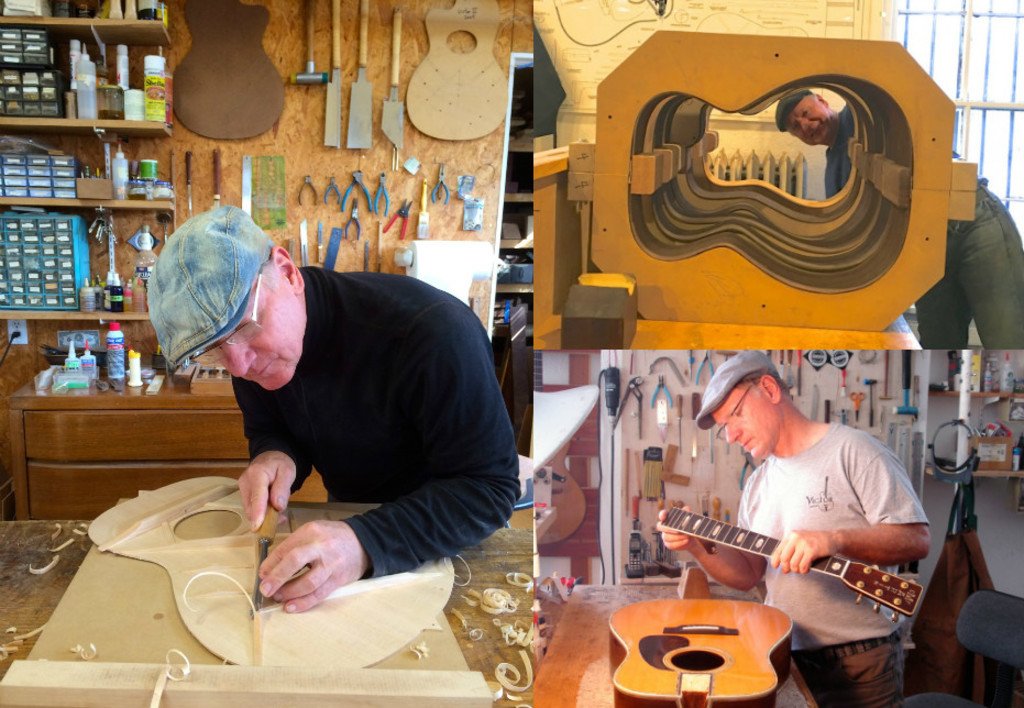
Location: 1457 S. Broadway, Denver
Specializes in: Acoustic Guitar Building, Teaching the art of Luthiery
Background: Edward Victor Dick of Victor Guitar has been building and repairing stringed instruments since 1975. Having grown up on a farm, Dick was on the lookout for something more. “Being a musician was the most exotic thing I could imagine. Guitars seemed absolutely magical,” commented Dick. He began playing guitar in his late teens and found himself to not be quite as good as other musicians around him. “I did seem to have a natural ability to fix things, however, and the musicians around me all had instruments that needed repair,” reflected Dick.
He found himself traveling to various cities to purchase broken instruments with the purpose of repairing and reselling them. He sought out different guitar builders and repairmen and began learning from what they were accomplishing. “The instruments themselves ultimately became my teachers and I eventually figured out how to build them,” stated Dick.
The need for help around his shop led Dick to train and teach individuals in the ways of repairing and building guitars. His penchant for teaching, having taught 14 apprentices who all went on to become professional luthiers, led him to founding The Colorado School of Lutherie in 2002, which has had over 250 graduates since its inception.
Artistry: Dick’s guitars have a simple elegance to them that professes decades of diligence and development of skill. “Wood is such an amazing material. Every species and each individual piece has such unique tonal characteristics. It’s like it has a life of its own,” he said.
He has also brought to life one of his own creations, a “banjola“. According to Dick, “The banjola looks a bit like a long necked mandolin, plays halfway between a guitar and a banjo and combines the tonal qualities of some of my favorite instruments.” The tonal qualities of tried and true materials and explorations into new materials are driving forces in his creation of unique instruments.
“I think the most important thing for me to remember is that, as a luthier, I am not creating a product in and of itself, but rather a tool for musicians. An instrument [that is not played] does not fulfill its purpose,” stated Dick.
Hackl Guitars
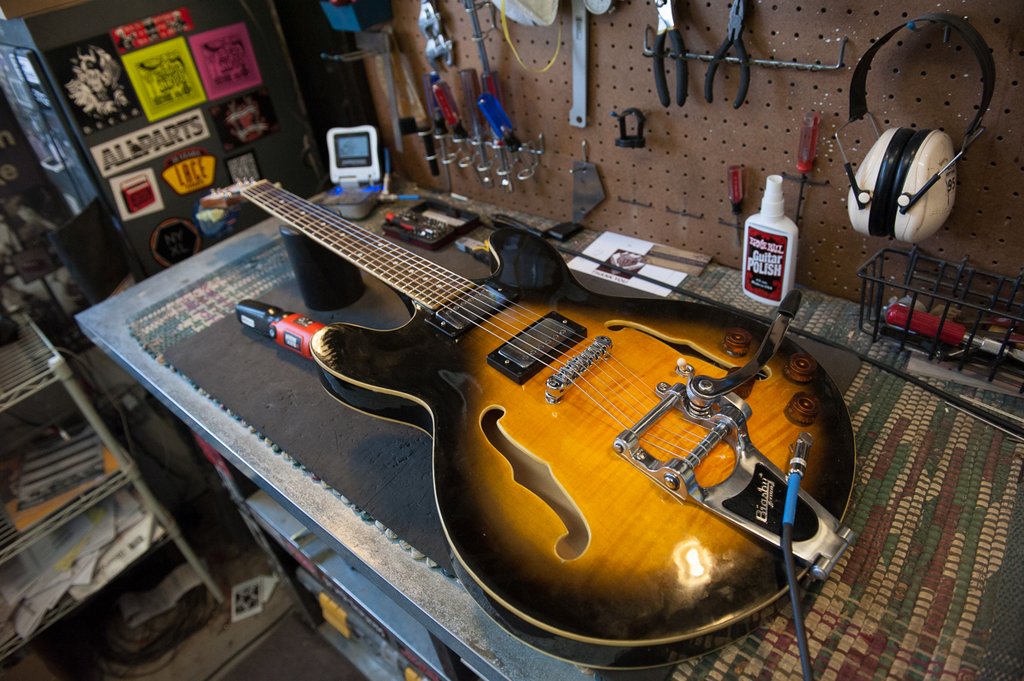
Location: 3139 Milwaukee St., Denver
Specializes in: Guitar repair, handcrafted custom guitars
Background: Who better to build custom guitars for musicians than an experienced touring musician? Justin Hackl of Hackl Guitars was on tour with various bands from 1997 to 2006. “I figured I always had to fix my guitars while on the road, so why not make a job out of it. My original intention was to just be a repair man, which is mostly what I am today. But after building a few guitars during my studies [at Roberto-Venn], I decided to continue to build once I opened my shop,” elaborated Hackl.
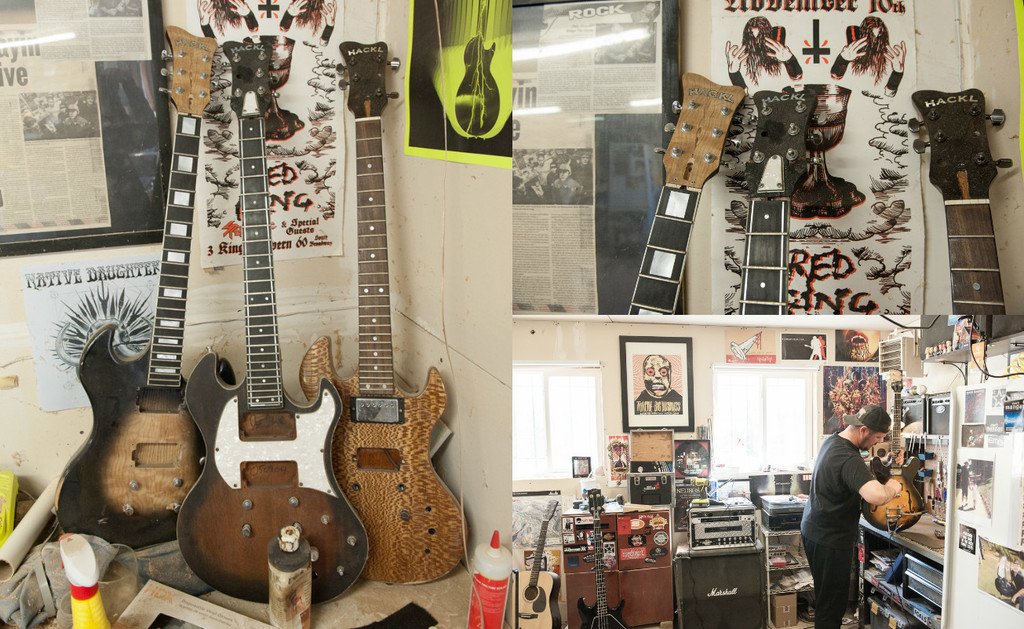
Another of the Roberto-Venn School of Luthiery attendees, Hackl was nicknamed “bandsaw” by the instructors; according to him, because of the mistakes he made while learning the building process. He initially attended the school in order to gain experience in repairing guitars, but found a love for building them.
Hackl convinced the landlord of his band’s practice space to let him use one of the spaces to run a guitar repair and building shop, which he maintained for two years while also working part-time for Vinyl Collective/Suburban Home Records. His repair and building business eventually turned into a full-time job after great success and Hackl moved into the current Park Hill neighborhood location.
Artistry: “My guitars are catered to whatever the player wants, but overall, they so far have been meant to be loud, heavy or aggressive in nature as far as tones go,” said Hackl of his guitar building aesthetic. And they do meet that criteria as he has built guitars for his band mates in Native Daughters as well as Zach Roach of Senses Fail and many other local Denver musicians.
The sound of the guitar is one of the largest priorities for Hackl’s builds.
“Tone quality is always on the top of my list, but I put a lot more stock into the pickups chosen rather than the woods. I feel the pickups are doing the majority of the work.”
Each of Hackl’s builds are unique. “I want each one to have its own personality and cater to go after exactly what the customer wants,” commented Hackl.
Highline Guitars
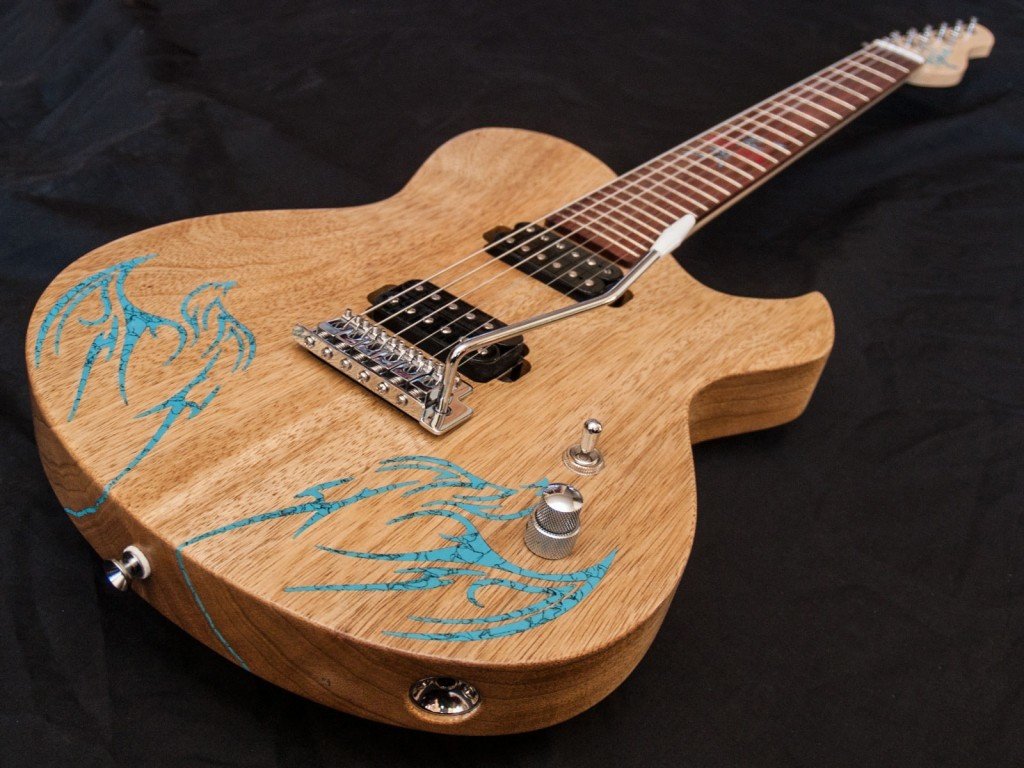
Highline Guitars Diabolique56 model showing beautiful CNC inlay. Photo courtesy of Chris Monck of Highline Guitars.
Location: Denver, Colorado
Specializes in: Custom guitar design and production, handcrafted pickups
Background: Chris Monck of Highline Guitars was an artist of many talents who struggled to find an outlet for his creativity that he could truly cultivate with a passion. That is, until his son, who was 11-years-old at the time, asked him to build a guitar for him to play. “I drew up a plan and made a guitar that he still has to this day,” said Monck.
Monck’s first business, eGuitar Plans, which he formed after that first build inspired him to create over 100 guitar designs, is still going strong today. He also continued to build guitars for pleasure and to fund more builds. Five years ago, he was inspired to create his guitar building business name after running along the Highline Canal trail. Before the creation of Highline Guitars, Monck had built 150 guitars and has since added another 59 to his repertoire.
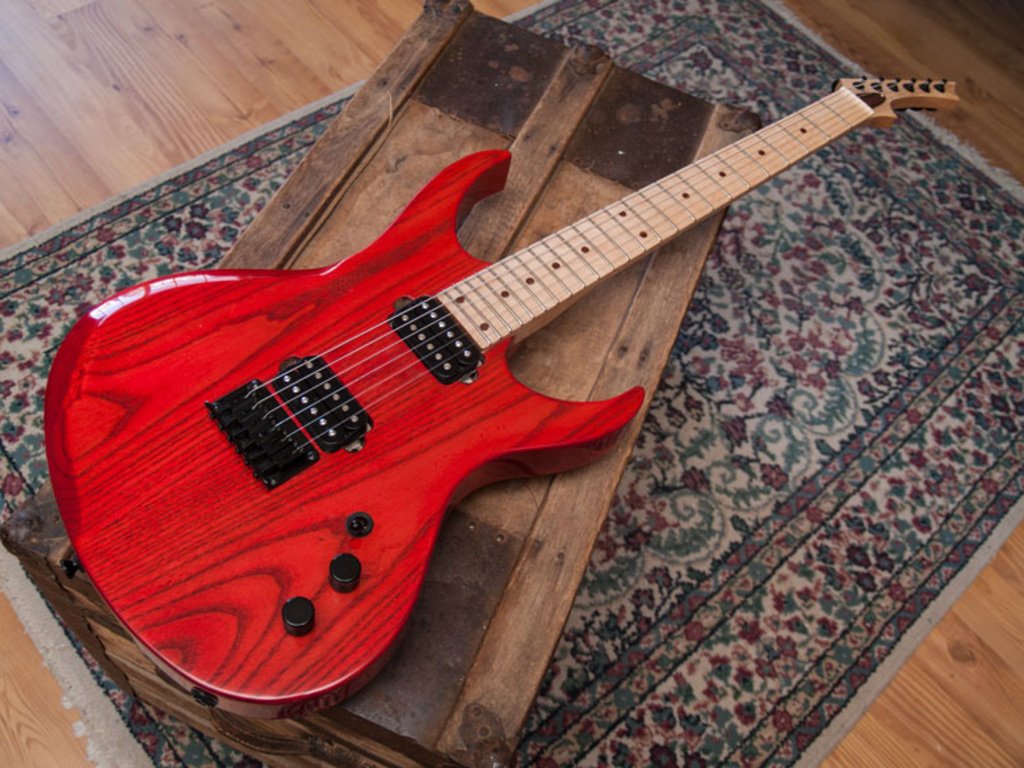
Artistry: Monck began building with traditional hand tools and has since incorporated newer technologies into his building process. He has recently added a CNC (Computer Numerical Control) machine to increase the efficiency of his process. “Most of the work is still done by hand using traditional tools and techniques since they still yield the best results. While technology is a great tool to have in a luthier’s arsenal, some tasks like finishing a neck contour or achieving perfect fret work are best done by hand,” added Monck.
“My customers are very picky about the tone they want from their guitars. Since the pickups dictate the tone of a guitar, I can achieve their goals by making my own rather than buying them off the shelf,” said Monck of his incorporation of pickup building along with custom guitar building.
Monck spoke about the future of luthiery and Highline Guitars by stating, “The way I see it, luthiers right now are faced with two paths they can follow. The first path involves traditional hand-building techniques and the second involves the use of modern technology. While the market for hand-built artisan guitars is still robust, the market for pure CNC built guitars is growing fast. Like many luthiers today, I’m trying to cut a third path between those two.”
Author’s Note: The author is currently married to Kyle VanDewart.

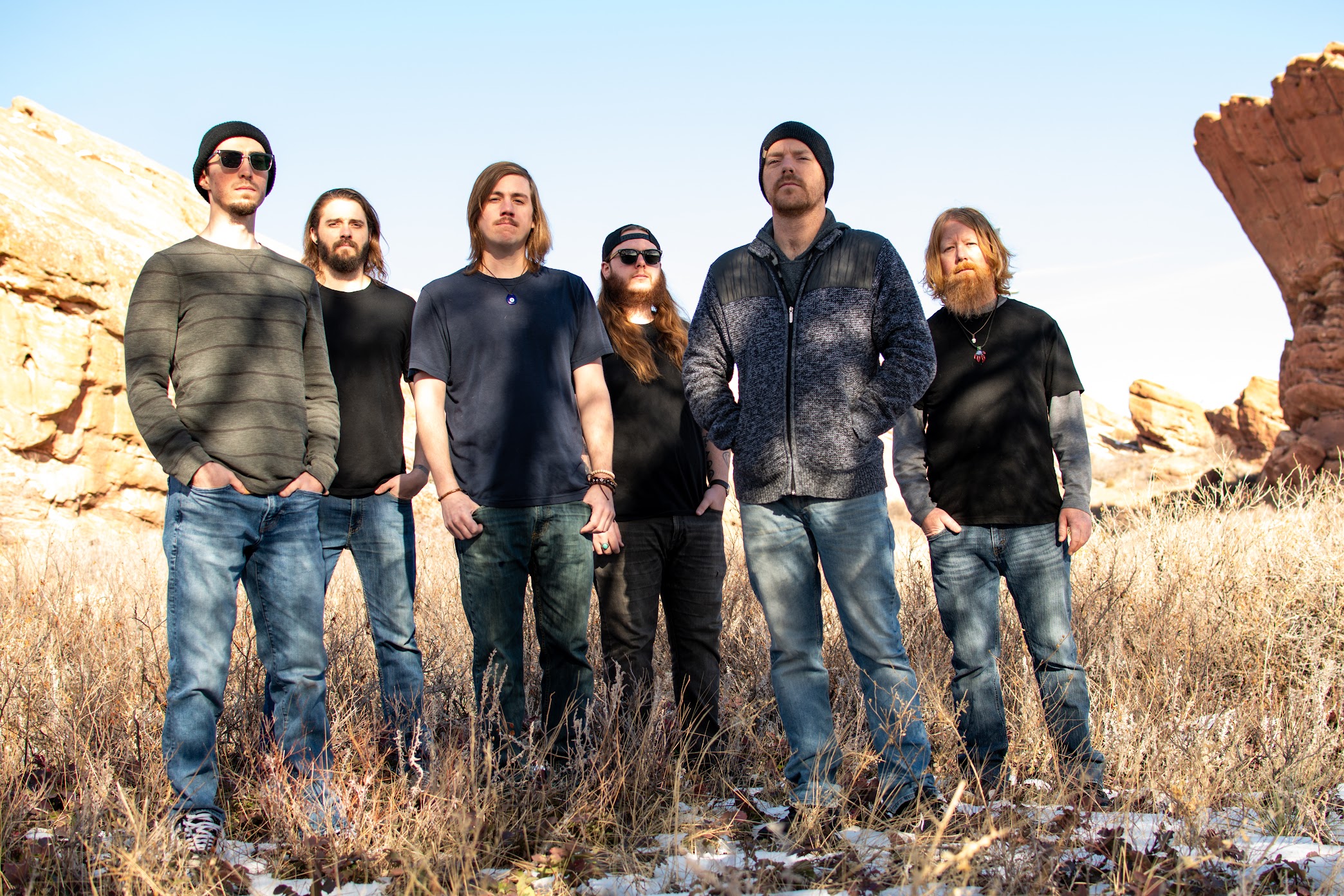
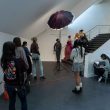

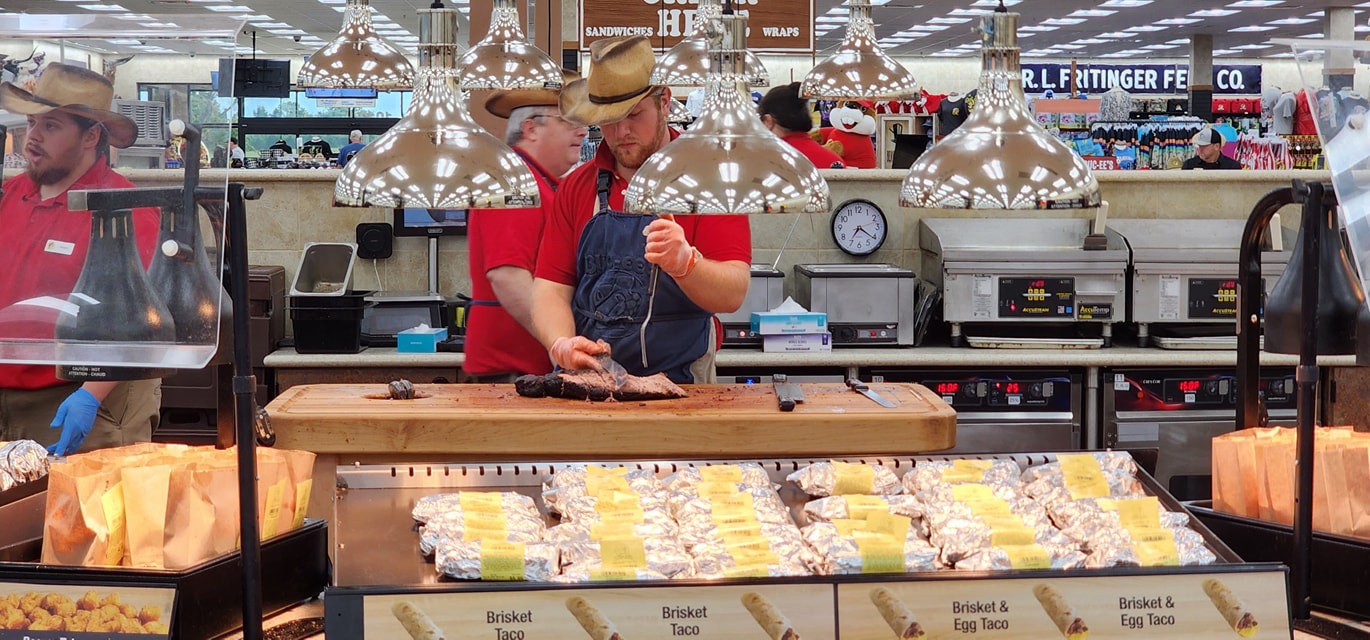
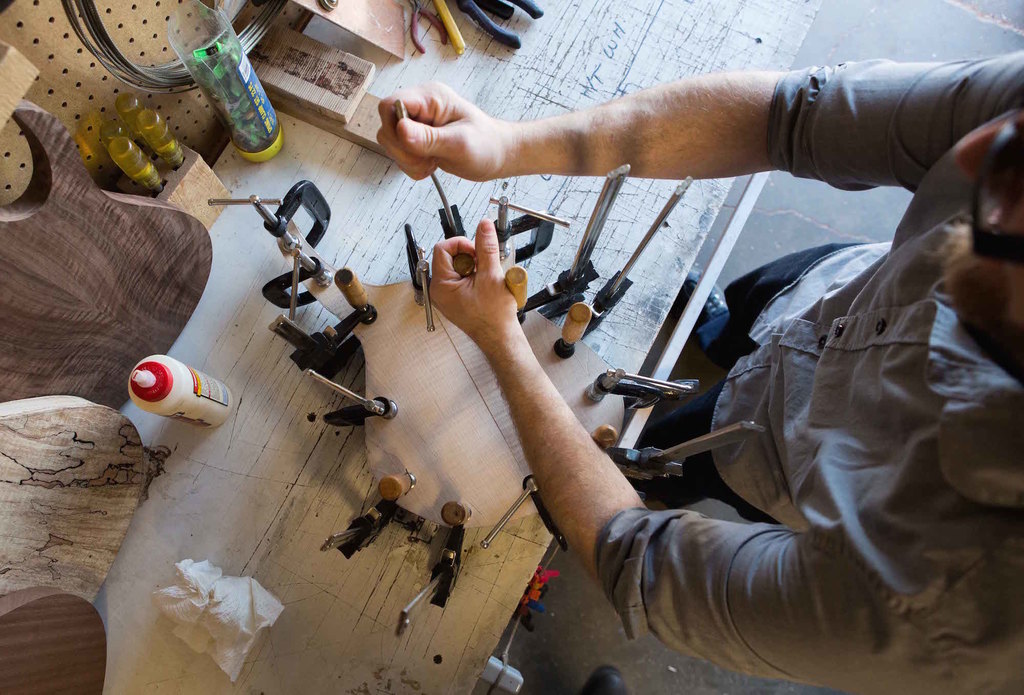
I am trying to get some information on a Colorado luthier Gary Stroup. Does anyone know much about him or his archtop guitars. I’d love to get some links to see some of his work and learn more about him. A man in Phoenix is offering me a Stroup guitar in trade for one of mine and I need more info to make a more informed choice in the matter. Thanks, David
David,
Thank you for reading this article and your interest in local Colorado luthiers. As with purchasing any guitar from an independent, custom or hand-builder, I would encourage you to do thorough research. The best places to find out more would be local luthier and guitar building forums on Facebook or other sites. These groups usually have well-informed personal experiences with a variety of luthiers. Best of luck to you!